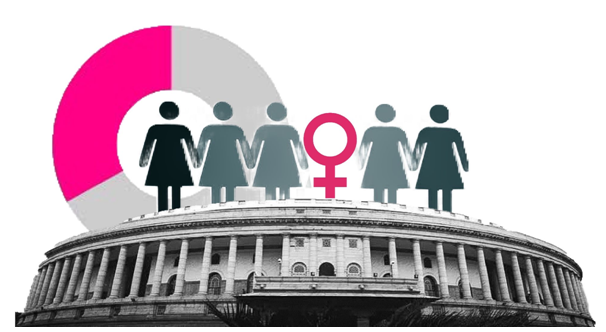Women’s Reservation Bill
Context: Bharat Rashtra Samithi (BRS) leader recently began a day-long hunger strike in New Delhi, demanding passage of the Women’s Reservation Bill (WRB). The Bill will reserve one-third of the total number of seats in state Assemblies and Parliament for women.
Women in Parliament
- The WRB was passed in the Rajya Sabha in 2010 but the Lok Sabha never voted on it.
- The Bill has since lapseed. The demand for reservation for women in legislative bodies is not new.
- It is seen as a logical extension of the 72nd and 73rd constitutional amendments (1992,1993), which reserved one third of all seats and chairperson posts for women in rural and urban local governments.
- Currently, just 14 percent of Lok Sabha MPs are women (78 in total). Women make roughly 11 percent of the Rajya Sabha.
- While the number has increased significantly since the first Lok Sabha, where women made about 5 percent of the total MPs, it is still far lower than many countries.
- According to data from PRS, Rwanda (61 per cent), South Africa (43 per cent) and even Bangladesh (21 per cent), are ahead of India in this matter.
- India ranks 144 out of 193 countries in the representation of women in Parliament, according to the Inter-Parliamentary Union’s latest report.
Why do we need more women in parliament?
- Even though ensuring greater representation for women will not solve all issues that affect them, it will be a good start.
- A study by the American Economic Association showed, countries with a higher share of women in national parliament are more likely to pass and implement gender sensitive laws.
- A 2010 study by the Harvard Kennedy School showed that female representation in village councils increased female participation and responsiveness to concerns such as drinking water, infrastructure, sanitation and roads.
- Moreover, political participation itself is a human right – regardless of the instrumental value of women’s representation in legislatures.
Evolution of women representation bill
- The WRB was first introduced in 1996 by the HD Deve Gowda government.
- After the Bill failed to get approval in Lok Sabha, it was referred to a Joint Parliamentary Committee chaired by Geeta Mukherjee, which presented its report in December 1996. However, the Bill lapsed with the dissolution of the Lok Sabha and had to be reintroduced.
- Atal Bihari Vajpayee’s NDA government reintroduced the Bill in the 12th Lok Sabha in 1998. Yet again, it failed to get support and lapsed. In 1999, the NDA government reintroduced it in the 13th Lok Sabha. Subsequently, the Bill was introduced twice in Parliament in 2003.
- In 2004, the UPA government included it in its Common Minimum Programme and finally tabled it, this time in Rajya Sabha to prevent it from lapsing again, in 2008.
- Five of the seven recommendations made by the 1996 Geeta Mukherjee Committee were included in this version of the Bill.
- On March 9, 2010, the Bill was passed in the Rajya Sabha with 186-1 votes after immense debate, creating history.
- The Bill, then, reached the Lok Sabha where it never saw the light of day. When the House was dissolved in 2014, it lapsed once again.
Heated debates, sexist taunts
- The WRB has seen some of the most heated debates ever in Parliament, with things devolving to the point of getting physical.
- For instance, in 1998, when Law minister M. Thambidurai rose to introduce the Bill on July 13, RJD MP Surendra Prasad Yadav marched to the well of the House, snatched the copy of the Bill from Speaker GMC Balayogi, and tore it to bits.
- Similarly, in 2008, as the Congress government introduced the legislation in the Rajya Sabha once again, Congress Parliamentarians had to provide protective cover to Law Minister HR Bhardwaj from Samajwadi Party members trying to snatch its copies from his hands as he introduced the Bill.
- There has also been a fair share of sexism that has always made its way to the debates. For example, in 1997, JD(U) veteran Sharad Yadav asked in the Parliament, “Do you think these women with short hair can speak for women, for our women…?”
| Practice Question
1. India ranks 144 out of 193 countries in the representation of women in Parliament. How will WRB improve the situation? |




